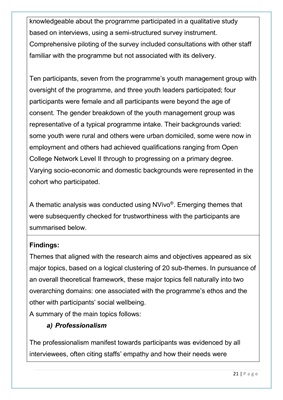
21 | P a g e
knowledgeable about the programme participated in a qualitative study
based on interviews, using a semi-structured survey instrument.
Comprehensive piloting of the survey included consultations with other staff
familiar with the programme but not associated with its delivery.
Ten participants, seven from the programme's youth management group with
oversight of the programme, and three youth leaders participated; four
participants were female and all participants were beyond the age of
consent. The gender breakdown of the youth management group was
representative of a typical programme intake. Their backgrounds varied:
some youth were rural and others were urban domiciled, some were now in
employment and others had achieved qualifications ranging from Open
College Network Level II through to progressing on a primary degree.
Varying socio-economic and domestic backgrounds were represented in the
cohort who participated.
A thematic analysis was conducted using NVivo®. Emerging themes that
were subsequently checked for trustworthiness with the participants are
summarised below.
Findings:
Themes that aligned with the research aims and objectives appeared as six
major topics, based on a logical clustering of 20 sub-themes. In pursuance of
an overall theoretical framework, these major topics fell naturally into two
overarching domains: one associated with the programme's ethos and the
other with participants' social wellbeing.
A summary of the main topics follows:
a) Professionalism
The professionalism manifest towards participants was evidenced by all
interviewees, often citing staffs' empathy and how their needs were